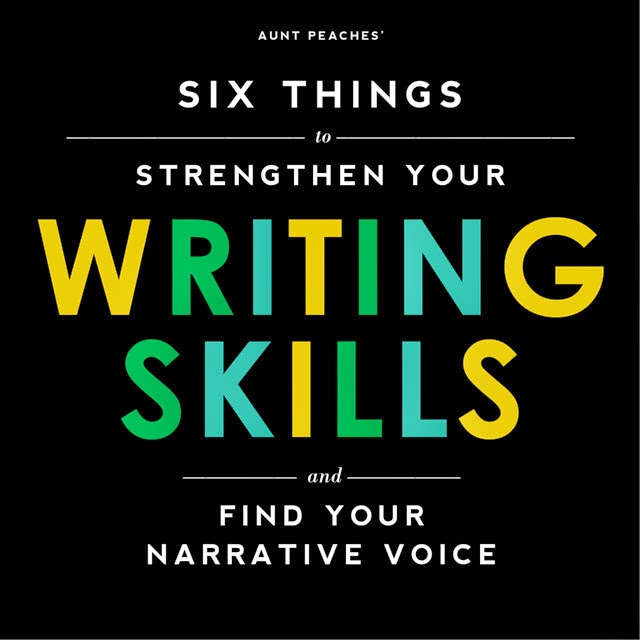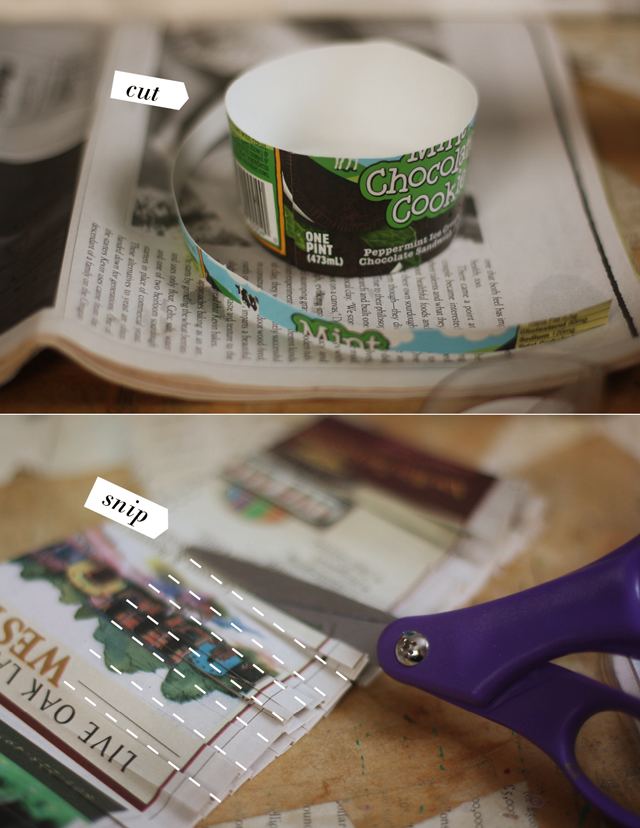Every once in a while I get an email from someone asking for advice about writing.
Some of these emails come from fellow bloggers, some are students looking to strengthen their voices, some are just curious about how to improve their skills. And that’s the thing right there—improvement.
And while it is flattering to think anyone would want my advice on the matter, I think what they really want to know is how to make their words more conversational. That’s what I do best: conversational writing. People tell me that they can hear my voice when they read my words— a wonderful compliment which is only surpassed by one that I’m about to share via humblebrag here: “I follow dozens of blogs every day and I skim them for pictures. I read yours top to bottom. Even if I don’t like the project, I always enjoy the words.”
Am I bragging? I’m bragging. Sorry. We’ll get to the un-bragging part in a sec, but let me start out by saying that if you are reading this and expecting tips on how to improve your grammar or the basic structural concepts of strong writing, this post is the last place you will find it. I’ll list some other sources along those lines at the bottom—feel free to skip ahead.
Also, I warn you, this is easily one of the longest posts I have ever written. The audience is specific. Very specific. I will not be offended if you skip or skim what comes below, but if this topic is something you genuinely want to explore, read on. Imma let lose. You feel free to chime in come comment time at the bottom.
So, let me start by confessing my absolute lack of authority on this subject. I was never an English major, and, in fact, I haven’t taken an English class since I was in 17 (Hollatcha Mr. Shoultz!). Back then—even in a classroom comprised of mostly ESL kids—I was, at best, a solid C student. I was in my 20s before I understood the difference between it’s and its. I’m still a little foggy on syntax. Homonyms give me nightmares. My spelling is consistently horrible and I am a painfully slow reader. Movie credits make me dizzy—I cannot keep up that fast. It can take me a whole month to finish reading a decent novel. I have been told by several educators that I’m mildly dyslexic, though no doctor has ever diagnosed me as such.
Why am I telling you this? Because none of that crap stops me from writing more than the combined written works of most of the people I know put together. And now, thanks to the internet and people like you, my words are read by more people in a single day than I have ever met in the whole of my life put together. I’m not saying this to boast, I’m saying this so we can get over our hangups. Don’t assume that just because something is widely read it is automatically good. By my standards, at least half the books in my local library are poorly written. That is my opinion. You can feel free to argue that point, but that isn’t going to change my standards. That’s what makes them mine.
Speaking of things that are mine, let’s ask the question; Is my writing good writing?
Meh.
Do I care if it’s not that great?
Not especially.
And that’s the issue right there. Good writing. People think of writing as a task of engineering. As though the fundamental principals must be sound and sacrosanct or the whole building will collapse. There is some fundamental truth to that idea, but too often adults get caught in the minutia of maintaining the self-appointed rules—the proper way to use a semi colon, the avoidance of split infinitives, the practice of restricting italics to titles of books and films.
Screw it.
Let me ask you something. If somebody told you that the definition of good writing was determined by a lack of typos, would you want to run out and read that person’s work?
Didn’t think so.
So let’s take another approach. Let’s think about writing not so much as an act of engineering, but something closer to painting. There is no right way to paint colors on a canvas, just as there is no wrong way to write words on the page. The painter is in charge. Sure, people are far more likely to understand the painter’s intentions and pay attention to their efforts when they follow basic fundamentals of composition; but, there is no universal law to dictate what is right, what is wrong, or what is beautiful.
Let’s just repeat that for a second because a lot of people reading this will need to hear it again: There is no right or wrong way to write.
When you hear someone describe something as “proper English,” I suggest you immediately ask them to cite their source. By what standard? MLA? AP? APA? The Chicago Manual of style? Strunk and White?
I’ll be honest, chances are, all five of those manuals are going to agree with your snippy friend there, but it opens up the subject of authority. Who is to say what is “proper English”? There would not be multiple authorities on this subject if these rules were not open to interpretation. Grammar Gestapos who are acquainted with all five of those manuals know they are riddled with contradicting standards. Based on my experience, I would sooner ask a law librarian how she feels about abortion before I would ever ask her for an opinion on the Oxford comma. Let’s just say, it’s a touchy subject.
Bottom line: There is no one expert to mandate one way or another. There is only style.
Now, granted, if you start styling your words with mixed characters and a total lack of punctuation, you will look like a dumbass. Or, pardon me, Ull l%k lk a dumb@$$. If that is what you want to convey, go for it. But don’t let anyone outside your mom and your English teacher give you flack for ending a sentence with a preposition. Bad grammar is one thing, poor manners are another.
And that is the problem. Many, many adults are intimidated by writing because some jerk along the way told them they were doing it wrong. Because they were tired of being corrected or reprimanded in public. Because they didn’t want to feel stupid. If you are one of them, this post is for you. If you are one of those who take joy in finding fault in the mistakes of others, lay off. I wrote another post for you—and that is one you can stick in your dictionary.
So now we have covered the ground rules. In short, There Are No Rules. I have no authority. I can tell you some of things I do to strengthen my writing voice, and you are welcome to take it, leave it, or trash it, but if at any time in this post you feel I am telling you what to do and how to do it, please forgive me and know that my intention provide suggestions, not some one-size-fits-all approach to English. The most readable writers are comfortable writers and that is what I am trying to convey below. I’m encouraging you to get comfortable. If you can become a comfortable writer, you will most likely become a more readable writer. You will have a strong narrative voice and people will stop reading your words on a page and start hearing your voice in their head. You won’t win any awards and the Grammar Gestapos might come after you, but you will have conquered an essential and sacred mode of expression: The written word.
Let’s get started.
1. Write every day.
At least a paragraph—hopefully a page. This is critical. It doesn’t matter what it is, just do it. Write. You want to long-hand in journal about your daily life? Go for it. You want to sit in your minivan waiting for your kiddo’s school to let out, typing on your smart phone, describing the dew collecting on the flagpole in the lawn? Great. Get in the habit of writing things that nobody will ever read. I heard someone once say that greatest/most successful/big name writers will only see 2 percent of their work ever published. What happened to the other 98 percent? Mostly, they toss it before anyone ever reads it. These people know how to edit themselves and that’s how they got to be great/successful/big names in the first place. Give up on the idea that your words are precious. They’re not.
For me, I write every morning. Before I get out of bed I grab my laptop and write stuff just to get it out of my head. This goes on anywhere from 20 minutes to two hours, depending on time and necessity and if I need to go to the bathroom. Once I get out of bed, it’s over. I feed the cat and forget about it. Those files are rarely, if ever, opened again. The topic varies widely—sometimes it’s memories, sometimes it’s an opinion, sometimes it’s an argument, sometimes it’s an opportunity to wax nostalgic upon the virtues of ‘N Sync. This morning it was about the time my cousin got us free third row tickets to a musical and Roger Ebert sat behind us with a glamorous black lady and one of them wouldn’t quit farting. You know, that old chestnut. Most of the stuff I write would never make sense to anyone but me. Most of it’s not very good, but it helps me to clear my head for the rest of the day, which in turn, makes me a more pleasant person to be around. I look at those dawn hours as an investment in my mental health and long-term creative talents.
Exercise
Get in the ritual habit of writing by designating 30 minutes each day for one week to doing nothing but writing. No distractions. No nothing. This isn’t a time for essays or emails, it’s a time for brain dumping whatever crap comes out of your head. Once you start the process, you will be surprised what comes out of your head. Just lock yourself in the bathroom if you have to. It’s best if you can do it at the same time everyday, preferably at a time when your mind is in “exit only” mode. For me it’s the mornings before I get out of bed. I developed this habit after reading “The Artist’s Way” Which is really an art therapy book but I suggest for anyone (again, more details on suggested sources below).
Tangent for long-time readers of this blog:
Sometimes people ask why I don’t write stories on the blog more often. The truth is, I write stories all the time, I just don’t post them. For the most part, they are just mental exercises. Catharsis. Those stories will never see the light of day. Not on this blog or anywhere else. Why? Because, like you, most of my interesting stories involve real people. Alive people. You will notice, most of the stories/essays published here involve people who are already dead. This may have made you think I was some sort of tribute sentimentalist, but it’s not that at all. See, there is this law that says that, essentially, anyone is welcome to write facts about any other person in public, but when you write things that describe or reflect that person’s character, good or bad, you then enter territory wherein one is obligated to verify those words with that person prior to publication. The law is open to interpretation, sure, but, seeing as this is a hobby blog, I’m not about to hire an attorney to split hairs with my work, or spend hours creating composite characters out of my real life friends and family. Maybe one day we will get there. Not yet. Unfortunately, in the early days of the blog, on the rare occasions I wrote about people who are alive and I gave them the piece beforehand, they got very uncomfortable. In some cases it damaged our relationship. Even when the words are kind and well-intended, people see themselves very different than however they read themselves in writing. Perception is a tricky thing. In the past, I have ended up removing most of my work and reducing it to basic facts that would not have required their approval to begin with. So here we are, my writing continues but publication is restricted to dead people or fiction. I’m not organized enough to pull off fiction. If you know me in real life and wonder why I have not written about you before, now you know; it is because you are not dead yet. Cheers!
2. Be a good reader.
Good readers make good writers. Is that not obvious? The thing is, most people think they are good readers; they’re not. It’s like how everyone thinks they are good drivers or have great senses of humor. The truth is, very few people do. The sooner we grasp this reality, the better we can be at developing whatever it is that we do best. And just because you read a lot does not mean you are a good reader. Want to know if you are a good reader? Try the exercise below.
Exercise
Next time you finish the chapter of a book, ask yourself three things;
1) What just happened here?
2) How did that sequence figure into the overall story/message of the book? 3 ) Am I going to remember this in a month?If you have trouble answering those questions, go back and reread the chapter. Being able to absorb another writer’s objectives will strengthen your ability to convey your intentions through your work.
Oh My God. Do you hear this? I am telling people to be careful readers. I am like one pair of reading glasses on a beaded chain away from being a school marm. Oh, Snarf.
3. Operate like a court reporter.
How fast can you type? More importantly, how slow can you speak? Can you get them together? If you can learn to speed or slow your words so that you are thinking, speaking, and typing at the same rate, a narrative voice will come easy to you. If you can get the words out of your head and onto the keyboard at the same time, writing will be no more difficult than speaking. Does this mean your words will be interesting and people will want to read them? No. Will you be able to turn them out faster than ever? Yup.
Exercise
Start out simple. Try typing your grocery list saying the words out loud. More than likely, you will find that you are speaking very slowly. This is good! We are talking about groceries here—who needs to talk about canned beans in a hurry? Take your time. Do this on a regular basis and you will improve in no time.

4. Take a lesson: Single White Female.
Let’s talk about painting again. This is my comfort zone. So, back in the day, one of my first classes in art school was taught by a woman named Persimmon who would make us duplicate swatches of old master paintings. On egg shells. Hollow eggs to be specific. My assignment piece was taken from a portion of the front left paw of a monkey from A Sunday on La Grande Jatte by George Seurat. It’s a pretty famous work. You may have seen it featured in the cinematic tour de force, Ferris Bueller’s Day Off. The painting takes up the better part of a room and tourists feel very smart for recognizing it in person. Most art historians regard the painting as an ode to adultery, but everyone loves to look at it and then go buy images of it printed on coffee mugs and tote bags. Sometimes I want to ask these people, Do you know your umbrella has a bunch of philandering hoochies on it? I digress. Anyway, so, standing in front of it with half a dozen other students, holding hollow eggs, praying nobody crashed the paint pots into the Seurat, was easily one of the more bizarre experiences of my life. The goal was to imitate another painter’s technique, but the lesson is this—question every brush stroke.
As the result of that lesson, can I now paint like George Seurat? No. Do I want to? Not really. Am I a better painter for having studied that stupid left monkey paw for three days? Absolutely.
Writing is the same. You need to find someone whose work you admire and roam around in his or her shoes for a while. I would suggest you start by identifying a writer you admire, someone you want to emulate, then go and read everything he or she ever wrote. Get his or her voice so ingrained in your head that you would recognize one of his or her sentences without any context by which to place it.
Exercise
Pick an author to impersonate and write an essay in his or her voice. What would it sound like if Virginia Wolf wrote a movie review on an Adam Sandler film? How would Hemingway describe lunch with his Mom at the Waffle House? How would Neil Diamond review chart-topping artists like Nicki Minaj and Cassis Orange?
Okay, I had to sneak my Neil in. Song writing is a form of authorship too.
5. Get ass backwards, first.
Are you ready to tackle something more substantial? Try leading with your butt. Okay, maybe it’s not your butt. Maybe it’s the last paragraph, or maybe it’s the last sentence. Start with the ending first. Margaret Mitchell wrote the last scene of Gone with The Wind first, then constructed the entire storyline to lead up to those moments. Some people consider it to be one of the most frustratingly ambiguous endings of all time, but had she capped it off with a predictable conclusion, the book would have petered away into the cannon of Angry Southern Romance. Something to think about, y’all.
Exercise
Pick up a magazine and flip through the pages, selecting one at random. Find an interesting statement on that page and commit to working it into the last sentence. Finding a way to lead up to it is a great way to break writer’s block.
6. Do Without.
The downfall of getting comfortable with writing is becoming over-reliant on the same words and sentence structures time and time again. Man, I do this all the time. Like starting my sentences with one word followed by a comma, then a brief statement. Gosh, that gets annoying. The best way to shake things up is to identify your standby writing habits and force yourself to temporarily do without.
Exercise
Take a 1,000 word chunk out of something you wrote and run it through a word frequency counter. Identify the top five words and temporarily remove them from your writing vocabulary. Warning, the words will probably be I, the, and, are, you, and so forth. Think that’s too hard? Fine, pick five out of the top ten, then write at least 1,000 words on something, anything, without using those forbidden words. This will force you to get creative with your sentence structures. I’ll be honest, the end result may not be your best work, but, when you come back to the next project, with all words at your disposal, your muscles will be stretched and set for action. See what happens!
Encore: Spill your guts. This is a hard one. It has nothing to do about finding your narrative voice but can help clear your head or break writer’s block.
I’ll bet you read that part about spill your guts and thought I was suggesting you write about your deepest secret or forbidden desires. Like how you pooped your pants on the bus in the third grade, or how you secretly hate your sister. Yeah, no. This is not that. This is about writing the thing that nobody wants to talk about, or even think about, but you know it’s there. Like instead of writing about how you hate your sister, write about all those times you were singled out over her to go with mom to get her hair cut and how that made your sister really mad and that made you really happy. Have you even thought about that in 20 years? Probably not. You probably feel like a little bit of a jerk right now, right? Like not a full-out jerk, but conflicted about your behavior at that time. Like maybe you should have done something different? Yeah. Go with that. Write from that moment. That’s the sweet spot. That is where your humanity shows. When you confess your true thoughts, even when they are not particularly flattering toward you, your readers are going to want to follow along. That doesn’t mean they share your thoughts or opinions, it means they trust you for having the balls to put them on paper.
Exercise
Write 300 words about something you are ashamed of. Not something that happened to you, something that resulted from your choice of action. Something you regret. Or maybe you don’t regret it; you just never want to admit it to anyone because you’re afraid they will judge you for it. Write it down then delete it or, or even more cathartic—print it out and burn it up. Does that feel good? Feel like you cleared your head? Good. Now go write something useful!
***
Resources to improve grammar and otherstuffs.
For general purposes
Plain Style: A Guide to Written English, Christopher Lasch
This was written by a college professor who got fed up with grading poorly written papers. That sounds boring but it’s actually a pretty good read. Lasch died in 1994, and if he could read the post above, I’ll bet he’d have a heart attack and die all over again. Yet, this does not stop me from admiring his approach. In short: clarity is king. Sometimes when I need to write something that is complex or argumentative, I’ll read a chapter or two from this book just to get his voice in my head (see tip #3). This book is what I would call a literary palate cleaner.
For historical, autobiographical, general essay type stuff
On Writing Well: The Classic Guide to Writing Nonfiction, William Zinsser
Zizzner has a warm and welcoming voice that in reality, is actually pretty brutal and at times judgmental. You know, like your mom. This book encourages writing without unnecessary words, focusing on the arrangement of true and simple statements. Zizzner encourages writers to trust that readers will fill in the blanks. If you like Hemingway, you’ll like Zizzner’s approach.
For bloggers
Mad Writing Skills: A Non-Threatening Guide to Grammar and Writing for the Creative Blogger, Jessica Hill
If you are a blogger, I would suggest you start with this one. It’s a $5, 45 page e-book you can print at home within a few minutes. Hill lays out the essentials of modern grammar as they apply to online readers and visual descriptions, which is something you are not going to find in the two works above. In this book she addresses things like emoticons and The Latter Day Plague otherwise known as curly brackets. {Shiver}. There are worksheets and a lesson plan that will help you not only become a better writer, but a better blogger. Yes it’s geared toward crafty bloggers but nearly all of it is applicable to non-bloggers as well. If you are all pumped up to get your English on this very minute, this is a great place to start!
For those in search of self improvement
The Artist’s Way: A Spiritual Path to Higher Creativity, Julia Cameron
This book is not so much about improving your writing as it is about reconnecting to the creative force inside you, writing being one of many vehicles to facilitate this union. Cameron composed this as a twelve week program, and although I have never been dedicated to doing all twelve weeks, I have taken a lesson from nearly every page in this book. I credit it for giving me tools that have come to be critical in my personal and professional life. It may have even saved my life. Now, is there some new agey horse crap in the mix? You bettcha. But don’t blow it off because you don’t want to eat your spiritual vegetables. The Artist’s Way is one of the all-time best-selling works of non-fiction, and for good reason: it’s a darn good book.
Do you have any recommended tips or writing resources? Chime in the comments below.







